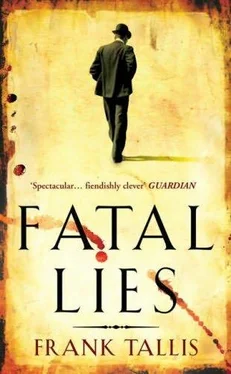Frank Tallis - Fatal Lies
Здесь есть возможность читать онлайн «Frank Tallis - Fatal Lies» весь текст электронной книги совершенно бесплатно (целиком полную версию без сокращений). В некоторых случаях можно слушать аудио, скачать через торрент в формате fb2 и присутствует краткое содержание. Жанр: Исторический детектив, на английском языке. Описание произведения, (предисловие) а так же отзывы посетителей доступны на портале библиотеки ЛибКат.
- Название:Fatal Lies
- Автор:
- Жанр:
- Год:неизвестен
- ISBN:нет данных
- Рейтинг книги:3 / 5. Голосов: 1
-
Избранное:Добавить в избранное
- Отзывы:
-
Ваша оценка:
- 60
- 1
- 2
- 3
- 4
- 5
Fatal Lies: краткое содержание, описание и аннотация
Предлагаем к чтению аннотацию, описание, краткое содержание или предисловие (зависит от того, что написал сам автор книги «Fatal Lies»). Если вы не нашли необходимую информацию о книге — напишите в комментариях, мы постараемся отыскать её.
Fatal Lies — читать онлайн бесплатно полную книгу (весь текст) целиком
Ниже представлен текст книги, разбитый по страницам. Система сохранения места последней прочитанной страницы, позволяет с удобством читать онлайн бесплатно книгу «Fatal Lies», без необходимости каждый раз заново искать на чём Вы остановились. Поставьте закладку, и сможете в любой момент перейти на страницу, на которой закончили чтение.
Интервал:
Закладка:
Rheinhardt tilted his head.
“But Becker didn't say anything about his wife's liaison with Zelenka!”
“You will recall,” said Liebermann, “that he said his wife was compassionate and easily moved to sympathy. He then said that Zelenka had taken advantage of her kind nature. However, he hesitated for a fraction of a second in the middle of the sentence.”
“What of it?”
“Well, it sounded like this: ‘Zelenka took advantage of her’… and then Becker added, almost as an afterthought… ‘kind nature.’ Psychoanalysis teaches us that there is much to be learned from a careful study of the subtleties of speech. The truth was too much to hold back. He could not stop himself from telling us what he knew. Moreover, when you asked him why he hadn't mentioned Frau Becker's fondness for Zelenka before, he made a significant verbal blunder. He said: ‘Why should I have? It's entirely relevant’ Of course, what he meant to say was: ‘ Why should I have? It's entirely irrelevant.’ The more an individual tries to conceal something of importance, the more he betrays himself with such errors! Finally, did you notice that whenever he spoke of his wife, he kept on touching his wedding ring? He was like a patient suffering from an obsessional neurosis, checking to ensure that some valued possession has not been entirely lost.”
“Most interesting,” said Rheinhardt, twirling his mustache, “Most interesting; however, the principal purpose of our visit to Saint Florian's today was to interview Herr Sommer, a man who you, for reasons still unclear to me, have always insisted would shine some light on the mystery of Zelenka's death. Now, as far as I'm concerned, our investigation has not been furthered greatly. He has simply confirmed what was already suspected: that Zelenka and Frau Becker were having an illicit liaison, that boys like Wolf torment scholarship boys, and that the headmaster turns a blind eye to such behavior.”
“I can assure you, Herr Sommer is…” Liebermann paused to select an appropriate word. “Involved.”
“How do you mean, ‘involved’? I don't understand.”
Liebermann tapped his fingers together. “Immediately after Sommer learned of Zelenka's death, he fell down some stairs and sprained his ankle-which gave him an ideal excuse to get away from Saint Florian's.”
“But it was an accident, Max! And it must have been a genuine accident or he wouldn't have volunteered the name of his physician, Professor Baltish. We can easily check his story.”
“No, Oskar. You misunderstand me. I am sure his sprain is real; however, as Professor Freud has explained, if one really examines the context of any accident, one can often see how it might have served some purpose. In other words, accidents are motivated. This motivation is, however, unconscious. The individual does not plan to have an accident. As far as he is concerned, it just happens.”
“All right, then, what does Herr Sommer's stumble mean?”
“Well, quite obviously, that he did not want to be questioned about Zelenka. He wished to postpone questioning for as long as possible-and he stood to benefit in two ways. First, the police investigation might have been closed before his return, thus he would have succeeded in avoiding questioning altogether. Second, if the police investigation was still in progress on the date of his return, he would have had sufficient time to collect himself and would be better prepared. Of course, it was always possible that you would travel to Linz in order to interview him-but even if you had, he would still have secured himself a period of respite. The fact that he needed time to think things through suggests the existence of a complex situation in which many factors needed to be taken into consideration. I had always suspected Herr Sommer's involvement — from the moment you mentioned his accident; however, my suspicions were confirmed beyond doubt when he arrived an hour late. Again, his error speaks volumes. He did not want to be interviewed. He was still attempting to avoid you. And the question you must ask yourself, Oskar, is: why?”
Rheinhardt frowned. “What are you suggesting, Max? That Sommer killed Zelenka?”
“Zelenka died of natural causes.”
Rheinhardt rolled his eyes. “According to Professor Mathias, but you have already admitted that the more we probe the world of Saint Florian's, the more we discover conditions and circumstances ordinarily associated with murder.”
Liebermann stared at his hands, and continued to tap his fingers together. “He was lying about the article in the Arbeiter-Zeitung.”
“What?” said Rheinhardt.
“You asked him if he was aware of the article, and he replied: ‘No, no… I wasn't aware… no.’ He denied knowledge of the article four times. A perfect example of overcompensation.”
“But people often repeat things.”
“Not four times, Oskar,” said Liebermann. He paused, and then mischievously drove his point home with a repetition: “Not four times.”
“Why on earth would he lie about that?”
“Consistency. I think it highly unlikely that Professor Baltish's sanatorium takes a socialist daily… and needless to say, Sommer also lied about the numbers in Zelenka's textbook.”
“Did he?”
“Oh yes. Did you see how red his ears went?”
“I attributed that to embarrassment.”
“No. His laughter was completely false, and he was far too eager to stress that the numbers were random. His story about the memory game was complete nonsense-although, on reflection, I imagine it was probably the best bogus explanation that he, or anybody else, might fabricate.”
“So,” said Rheinhardt, his face becoming lined with intense concentration. “What have we surmised? First, Zelenka and Frau Becker were having a sexual liaison. Second, Sommer did not want to be interviewed after Zelenka's death, and third, he is a liar-his most notable lie being that the numbers in Zelenka's exercise book represent nothing more than a silly game… What if…” The creases on Rheinhardt s face deepened. “What if Sommer learned of Zelenka's affair with Frau Becker, and conspired with Zelenka to blackmail her? He is clearly not a man of means. Their activities might have necessitated coded communications.”
Liebermann frowned, crossed his legs, and brushed a fold from his trousers. He was clearly unimpressed.
“Becker knew that Zelenka was ‘taking advantage’ of his wife. Therefore, his relationship with the boy must have been strained, difficult… and yet there is nothing to suggest that this was the case. In fact, Zelenka appears to have been something of a teacher's pet… sucking up to his science master and requesting extra assignments, which Becker was happy to provide.”
Rheinhardt suddenly remembered how Liebermann had behaved when Becker had left the room.
“Oh yes. Why did you taste Becker's medicine?”
“I wanted to know what it was.”
“And did you recognize it?”
“Yes, I think so-although it was an unusual prescription for headaches.”
Liebermann smiled faintly, and turned his face to the window, resuming his inspection of the runnels of rainwater. Rheinhardt, accustomed to his friend's irritating penchant for mystification, managed some halfhearted tutting to communicate his annoyance.
“It is all utterly infuriating,” said Liebermann. “Clearly, there is something going on at Saint Florian's… but it is almost impossible to ascertain what! I am reminded of the frustrating phenomenon of being unable to recall a familiar name. The name hovers at the periphery of awareness, and the more you try to remember it, the more it seems to evade recollection. Perhaps we should stop thinking about this right now-or Becker won't be the only one with a headache!”
Читать дальшеИнтервал:
Закладка:
Похожие книги на «Fatal Lies»
Представляем Вашему вниманию похожие книги на «Fatal Lies» списком для выбора. Мы отобрали схожую по названию и смыслу литературу в надежде предоставить читателям больше вариантов отыскать новые, интересные, ещё непрочитанные произведения.
Обсуждение, отзывы о книге «Fatal Lies» и просто собственные мнения читателей. Оставьте ваши комментарии, напишите, что Вы думаете о произведении, его смысле или главных героях. Укажите что конкретно понравилось, а что нет, и почему Вы так считаете.












